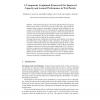Free Online Productivity Tools
i2Speak
i2Symbol
i2OCR
iTex2Img
iWeb2Print
iWeb2Shot
i2Type
iPdf2Split
iPdf2Merge
i2Bopomofo
i2Arabic
i2Style
i2Image
i2PDF
iLatex2Rtf
Sci2ools
118
click to vote
OTM
2009
Springer
2009
Springer
A Component Assignment Framework for Improved Capacity and Assured Performance in Web Portals
Abstract. Web portals hosting large-scale internet applications have become popular due to the variety of services they provide to their users. These portals are developed using component technologies. Important design challenges for developers of web portals involve (1) determining the component placement that maximizes the number of users/requests (capacity) without increasing hardware resources and (2) maintaining the performance within certain bounds given by service level agreements (SLAs). The multitude of behavioral patterns presented by users makes it hard to identify the incoming workloads. This paper makes three contributions to the design and evaluation of web portals that address these design challenges. First it introduces an algorithmic framework that combines bin-packing and modeling-based queuing theory to place components onto hardware nodes. This capability is realized by the Component Assignment Framework for multi-tiered internet applications (CAFe). Second, it deve...
| Added | 27 May 2010 |
| Updated | 27 May 2010 |
| Type | Conference |
| Year | 2009 |
| Where | OTM |
| Authors | Nilabja Roy, Yuan Xue, Aniruddha S. Gokhale, Larry W. Dowdy, Douglas C. Schmidt |
Comments (0)

